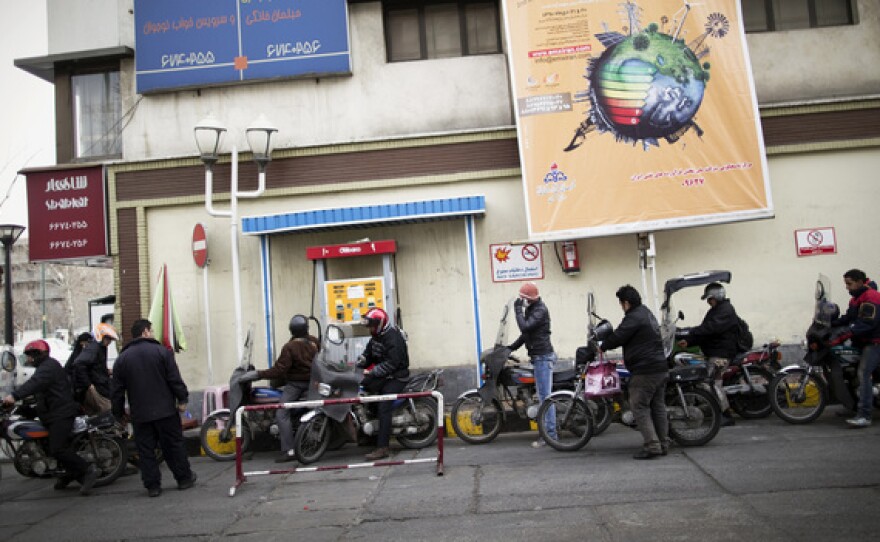On July 1, the European Union says it will stop buying oil from Iran. Europe is one the most important markets for Iran's oil, and in anticipation of the boycott, Iranian oil exports worldwide are already down by more than 25 percent.
Iran's leaders say they can weather this pressure, and so far they have refused to budge on their controversial nuclear activities, ones that prompted a series of economic sanctions.
As a result, it appears as if Iran will only face even greater difficulties when it comes to exporting oil, the lifeblood of its economy.
Iran is facing nothing but trouble in the global oil market, says Steve LeVine, energy analyst and author of The Oil and the Glory.
"It's being hit on two sides — fewer absolute sales and it's getting less money for the sales that it's making," LeVine says.
Sales to Europe are already down by a half from a year ago, and Iran is having a good deal of difficulty making up the difference, say LeVine.
"Even the countries that have been agreeable to buy Iran's oil have cut back," he says.
Iran Running Out Of Options
Iran was expecting Asian markets to increase their imports, but right now that piece of the picture looks murky.
China, India, Japan and South Korea are all under pressure from the United States to stop importing Iran's oil. China, for one, has negotiated deep discounts on the oil from Iran it is buying.
Couple that with the current downward pressure on oil prices and that turns into significantly less revenue for Iran.
Iran still keeps pumping oil, but it can't sell it all, says David Goldwyn, former State Department special envoy for international energy affairs.
"Since the threat of the E.U. embargo and the imposition of the U.S. sanctions, Iran has had to reduce its exports and put a good deal of its production into storage," he says.
Iran has limited storage capacity on land. It's also been filling up its small fleet of oil tankers and parking them just outside its Persian Gulf ports. But it's running out of cargo space.
And then there's Iran's insurance problem. Most of the key European firms have stopped selling insurance on Iranian oil. That's proving to be a key factor in curtailing Iran's oil exports, says Goldwyn.
"The denial of insurance for the tanker fleet is the most effective tool that we have, because it doesn't require countries to do anything. It just shuts off the access to the trade," he says.
All of these factors come at a time when there's plenty of oil for sale globally and the price is dropping.
Iran usually exports about 2.2 million barrels of oil a day. Right now that's down about 600,000 barrels a day. Once the European boycott kicks in, it means Iran's oil exports could be cut in half.
Other Produces May Step In
Muhammad Sahimi of the University of Southern California, an Iran analyst who writes for the website Tehran Bureau, notes that if Iran can't sell its oil on world markets there are other oil producers eager to fill the gap.
"Saudi Arabia, Angola, Iraq and more recently Libya have been increasing their oil production. And therefore they will be able to compensate for the amount of oil that Iran will lose in exports," he says.
It's hard to see where there are any trends right now running in Iran's favor, says Sahimi.
"All of these factors together have created the conditions that have enabled the United States and its allies to impose sanctions on Iran, cut Iran's oil exports, while not really contributing to a significant increase in the price of oil," he says. "In fact, if anything, the price of oil has decreased over the past several weeks."
Iran has found it difficult to respond, says Goldwyn, the former State Department official.
"Over the next four months, I think you will see the potential for a gradual softening of oil prices and an increase in alternate supply," he says. "The longer that situation continues, the harder it will be for Iran to sustain production."
Iran has turned off the global positioning beacons on its own oil tankers, in an effort, apparently, to hide the movement of its tankers. That could facilitate smuggling. There will always be some smuggling, but oil analysts don't believe that can compensate for the losses that the growing oil embargo is about to bring to Iran.





